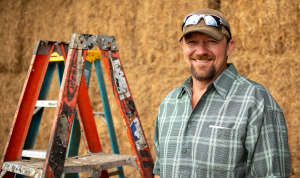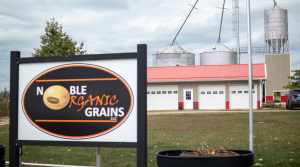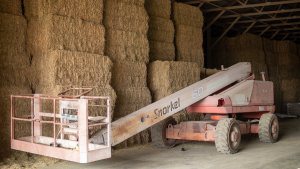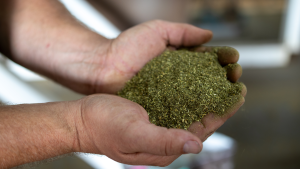Organic farmer receives electric cooperative support to expand business to create animal feed
Several years ago, the 550-foot-long barn at Noble Organic Grains bustled with cows to sell to nearby dairies.

Noble Organic Grains owner Joel Mecklenburg. He has worked with Noble REMC employees as he has added equipment to create organic food pellets for animals.
The northeastern Indiana farm’s barn is now brimming with bales of organic hay – that will soon be feeding cows and other farm animals across the U.S.
Noble Organic Grains received more than $24,000 in Power Moves® rebates from Noble REMC, its local electric cooperative, for energy efficiency upgrades to motors that are part of the farm’s expansion to create pelletized organic feed for farm animals. Noble Organic Grains owner Joel Mecklenburg, who plants organic crops on his farm, includes alfalfa in rotation with seed corn as a form of natural weed control. Yet there isn’t a big market for organic hay, Mecklenburg said, so he harvested the hay and stored it in the former cattle barn. As it began to fill, he learned there was a unique opportunity for creating alfalfa pellets that could be mixed with feed for grass-fed cows and other animals.
“I want to build my own market,” Mecklenburg said of the new expansion. “If there’s some way to do something different, I enjoy finding it. Just like growing organic crops.”

Noble Organic Grains in Noble County, Ind. Owner Joel Mecklenburg several years ago added organic alfalfa to his crop rotation to help with weed control. He stored the harvested alfalfa hay in his barn, and conceived of the expansion to turn it into pelletized food supplements for grass-fed cows and other animals.
Dairies with grass-fed cows can make use of the organic feed; cows that do not eat grain struggle with reaching their maximum milk volume each day, leading to lower sales for the dairies, Mecklenburg said. The organic feed produced by Noble Organic Grains can help minimize that potential loss. In addition to cattle, horses and other animals can also consume the pellets mixed in with their rations.
“We have a lot of product to move,” Mecklenburg said of the hay, which he has stored for the last three years. “I think there’s a good market out there, once we’re completely up and running.”
Mecklenburg developed a multistep process to pelletize the hay in several machines to a proper bulk density that can be sold to feed mills. He installed variable frequency drives on large motors running the equipment; while farms typically have appliances and systems with up to 20-horsepower motors, several motors in his pellet mill are more than 200-horsepower.

Some of the stored hay bales in the barn of Noble Organic Grains. It will be used to make pelletized organic animal feed. The agribusiness received Power Moves rebates from Noble REMC for energy efficient upgrades to the equipment, which also will save in long-term energy costs.
He contacted Noble REMC, his local electric cooperative, about his new operation. They informed him of steps he would need to take and the Power Moves program for the VFDs. Mecklenburg, who also participates in Noble REMC’s PowerShift demand-response program with his farm’s irrigation system, has regularly talked with Noble REMC employees as his project developed.
“When you get into motors of that size, it’s a whole new world. It’s like a miniature factory on a farm,” Mecklenburg said. “It’s nice to have cooperative employees help with this and help understand it. Everyone at the REMC is top notch.”
Mecklenburg began shipping feed in March, averaging 52,000 pounds weekly. By the end of the fall, he hopes to be able to ship four times that amount.

Noble Organic Grains owner Joel Mecklenburg’s ground alfalfa. Noble Organic Grains received Power Moves® rebates from Noble REMC, its electric cooperative, for energy efficiency upgrades to motors installed as part of an expansion to create organic animal feed pellets.
“Joel’s creative approach along with his entrepreneurial mindset has led him down innovative paths, with unique ways to support farmers in Indiana and even beyond the Midwest,” said Ron Raypole, CEO of Noble REMC. “We’ve enjoyed working with Joel and seeing everything that Noble Organic Grains is doing, and we are excited to see his farm continue to grow.”
Noble Organic Grains will install additional equipment before the farm can start consistently running multiple weekdays. Mecklenburg anticipates that he has enough hay stored to create pelletized feed into 2024; future plans include creating a packing area to package the feed on site and sell directly to consumers, and even create a process for local farmers to pelletize the hay they’ve harvested.
“When I first started, I always want to do something different,” Mecklenburg said, “but I didn’t look into a crystal ball and really think of where we would be today.”